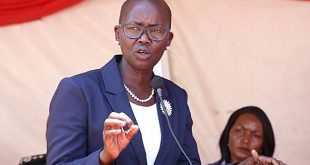Uganda’s Director of Public Prosecutions (DPP), Lady Justice Jane Frances Abodo, issued a powerful call to action against human trafficking, describing it as a “silent global pandemic” that demands immediate and coordinated efforts to eradicate.
Speaking at the opening of the Second National Workshop on Standard Operating Procedures (SOPs) for Investigating and Prosecuting Cases of Trafficking in Persons (TiP), Abodo underscored Uganda’s unwavering commitment to tackling this growing crisis, highlighting both the progress made and the significant challenges that remain.
“Human trafficking is not a distant issue; it is here, in our communities,” Abodo declared in her opening remarks to a gathering of law enforcement officers, legal professionals, and international partners from organizations such as CIVIPOL and the United Nations Office on Drugs and Crime (UNODC). “It is a crime that destroys lives, breaks families, and tarnishes futures. It is an invisible enemy that thrives in the shadows but leaves behind devastation.”
Abodo’s speech highlighted the disturbing scale of the problem. In 2023 alone, over 1,200 trafficking cases were recorded across Uganda. From January to October 2024, more than 1,000 victims of human trafficking were identified, many of them vulnerable individuals lured by promises of better opportunities, only to find themselves exploited and trapped. “Data is crucial in our fight against trafficking,” Abodo emphasized. “It must be accurate, reliable, and actionable. Without this, we cannot target our resources effectively or measure our success.”
The DPP praised the efforts already in place, including trafficking operations, prevention campaigns, and information-sharing initiatives. However, she pointed out that these efforts must be strengthened to keep pace with the increasingly sophisticated tactics used by traffickers. “We have made progress, but there is more work to be done,” she said. “The challenge is evolving, and we must evolve with it.”
A central theme in Abodo’s address was the need to strengthen Uganda’s legal framework. Despite significant progress, she identified several gaps in the country’s approach, particularly the absence of a comprehensive witness protection law. Without proper protection, victims who are often key witnesses to trafficking crimes are vulnerable to intimidation and retaliation, which can prevent them from coming forward to testify.
“We cannot expect victims to speak out if they do not feel safe,” Abodo stated firmly. “A strong witness protection system is critical to ensuring that traffickers are brought to justice and that those who come forward are not silenced by fear.”
In addition to the need for improved witness protection, Abodo stressed the importance of amending and testing existing laws in Uganda’s courts to ensure they are effective in addressing the complexities of human trafficking. “We must stop the inaction,” she urged. “Our laws must evolve to keep pace with the criminal tactics of traffickers. We need to make it unsafe for criminals to operate in Uganda. Our legal framework must be tested in the courts and amended where necessary to ensure justice is served.”
Abodo’s remarks also underscored the significance of international collaboration. She highlighted the role of CIVIPOL and UNODC, who have been instrumental in supporting the development of Uganda’s Standard Operating Procedures (SOPs) for handling trafficking cases. These SOPs, which provide detailed guidance for investigators and prosecutors, represent a coordinated approach to tackling human trafficking and are an essential tool in Uganda’s national strategy.
“The SOPs give us a roadmap,” Abodo explained. “They guide us in ensuring that every step we take, from investigation to prosecution, is in line with best practices. But these are not just guidelines; they are a call to action. The fight against human trafficking is not just the responsibility of one agency or one country; it requires collaboration, both locally and internationally.”
Abodo expressed deep gratitude to all partners involved in the development and implementation of the SOPs, recognizing the contributions of local and international organizations that have played a key role in shaping Uganda’s anti-trafficking strategy. “Thank you to all the partners who have stood with us, not only in the development of these procedures but in the practical work on the ground. Your support is invaluable,” she said.
But it was her closing remarks that resonated most with the attendees. Abodo issued a collective call for greater community awareness, stronger legal protections, and continued international cooperation in the fight against trafficking. “This is not just the responsibility of the government or law enforcement agencies; it is a collective responsibility,” she emphasized. “We must all work together—government, law enforcement, civil society, and local communities—to stop this heinous crime.”
She also called for a deeper focus on community empowerment, urging Ugandans to be vigilant and aware of the risks of trafficking in their own neighborhoods. “We need to raise awareness at the community level, especially among vulnerable groups, to help them identify the signs of trafficking and avoid falling victim to these criminals,” she said.

Abodo’s remarks underscored the urgency of the situation and set a clear direction for the work that lay ahead. “Together, we must make Uganda a hostile environment for traffickers,” she said. “We will not rest until this crime is eradicated, and those responsible for trafficking will be held accountable.”
As the workshop continued, the room buzzed with energy as law enforcement officials, legal experts, and international partners discussed strategies for improving Uganda’s anti-trafficking efforts. The collaborative spirit and renewed commitment were evident, with all participants acknowledging that while progress had been made, the fight against trafficking was far from over.








